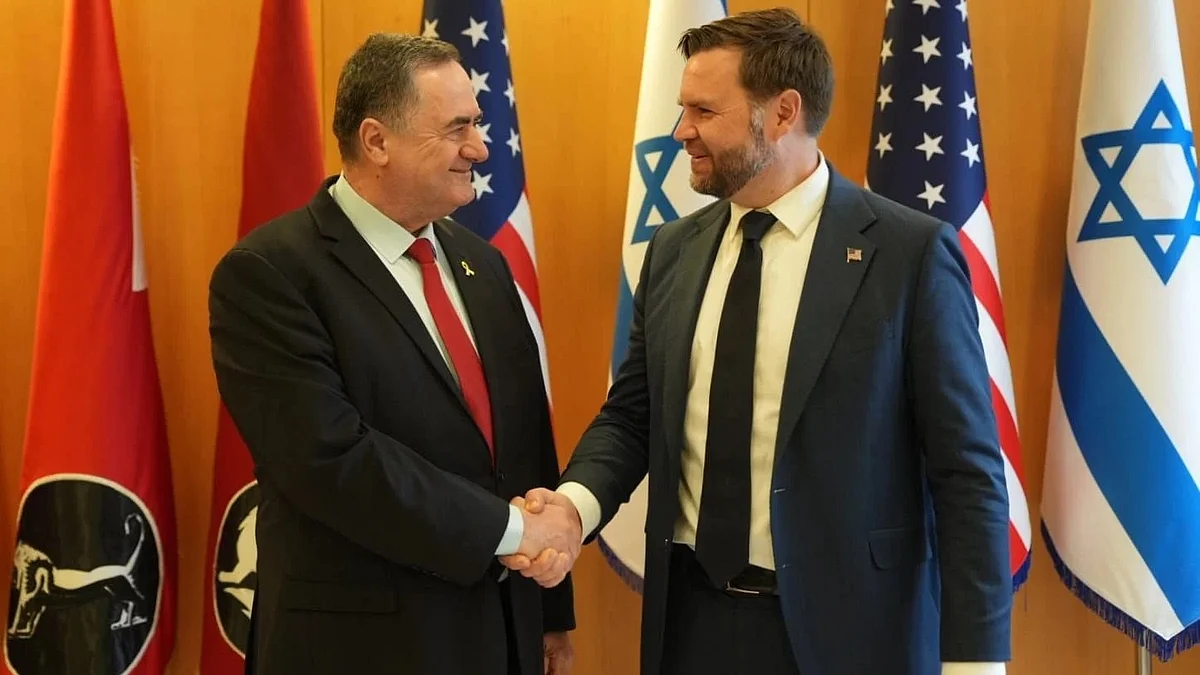Vance calls Israel's parliament vote on West Bank annexation an 'insult'
The Knesset narrowly passed a preliminary, non-binding motion endorsing annexation of the West Bank

US vice-president J.D. Vance on Thursday sharply criticised a symbolic vote in Israel’s Parliament (Knesset) supporting the annexation of the occupied West Bank, calling it an “insult” and a rejection of Trump administration policy.
The Knesset on Wednesday narrowly passed a preliminary, non-binding motion endorsing annexation of the West Bank — a move widely seen as an attempt by hardliners to embarrass Prime Minister Benjamin Netanyahu while Vance was still visiting Israel.
The Bill, which needed only a simple majority of lawmakers present, passed 25–24, but is considered unlikely to advance through the additional rounds of voting required to become law. Netanyahu, who opposes the proposal, has several procedural tools to delay or block it.
Speaking to reporters on the tarmac at Tel Aviv’s Ben Gurion Airport before his departure, Vance said he viewed the vote as deeply counterproductive. “If this is a political stunt, then it is a very stupid political stunt,” Vance said. “I personally take some insult to it. The policy of the Trump administration is that the West Bank will not be annexed by Israel.”
The vote has added to the growing strain on Netanyahu’s fragile right-wing coalition, which is already riven by internal divisions over the ceasefire deal with Hamas and Israel’s ongoing security posture. Some members of his alliance have criticised Netanyahu for what they see as excessive concessions, while others have pressed him to move ahead with annexation despite US opposition.
While many coalition lawmakers, including from Likud, have long supported annexation, they have publicly toned down such rhetoric since former President Donald Trump said last month that he opposes any Israeli move to formally absorb the West Bank.
The United Arab Emirates, one of Washington’s closest partners in the Middle East and a key player in Gaza peace efforts, has warned that annexation would cross a “red line”.
The Palestinians, who seek both the West Bank and Gaza Strip — territories captured by Israel in the 1967 Middle East war — for their future independent state, say annexation would extinguish any remaining chance of a two-state solution. Most of the international community continues to back that framework.
Vance also shared new details about US postwar planning for Gaza, saying reconstruction could begin soon in certain “Hamas-free” zones, even as he cautioned that rebuilding the devastated enclave would take years.
“The hope is to rebuild Rafah over the next two to three years and theoretically you could have half a million people live there,” Vance said.
The war, now in its second year, has levelled much of Gaza’s infrastructure. In July, the United Nations estimated that fighting had generated roughly 61 million tonnes of debris across the territory. A joint assessment earlier this year by the World Bank, UN, and European Union estimated that full reconstruction would cost about USD 53 billion.
According to Gaza’s health ministry, at least 68,280 Palestinians have been killed since the conflict began. The ministry’s tally, which does not distinguish between combatants and civilians, is regarded by UN agencies and independent analysts as broadly credible, though Israel disputes the figures and has not provided its own count.
Vance’s visit to Israel came amid an intensified US diplomatic and military effort to stabilise the situation in Gaza and prevent renewed hostilities. Earlier this week, he announced the opening of a civilian-military coordination centre in southern Israel, where roughly 200 US troops are working alongside Israeli forces and delegations from other nations on plans for Gaza’s recovery and security.
The United States is seeking backing from its Gulf Arab partners to establish an international stabilisation mission in Gaza that would train and deploy a new Palestinian police force.
“We’d like to see Palestinian police forces in Gaza that are not Hamas and that are going to do a good job, but those still have to be trained and equipped,” US Secretary of State Marco Rubio said ahead of his own visit to Israel.
Rubio, who was scheduled to meet Netanyahu later on Thursday, also joined Vance in condemning the far-right lawmakers’ annexation push.
The annexation vote and the broader political instability in Israel come as Washington intensifies its monitoring of Netanyahu’s handling of the fragile ceasefire with Hamas. Israeli media have described the recent surge of high-level American visits as a form of 'Bibi-sitting' — a term that plays on Netanyahu’s nickname and a decades-old campaign slogan in which he portrayed himself as the 'Bibi-sitter' Israelis could trust to keep their families safe.
For Netanyahu, who is under growing domestic and international pressure, the message from his most important ally is clear: as Israel rebuilds Gaza and navigates its own internal fissures, Washington expects both restraint and accountability — not unilateral moves that could derail peace efforts.
With agency inputs
Follow us on: Facebook, Twitter, Google News, Instagram
Join our official telegram channel (@nationalherald) and stay updated with the latest headlines
